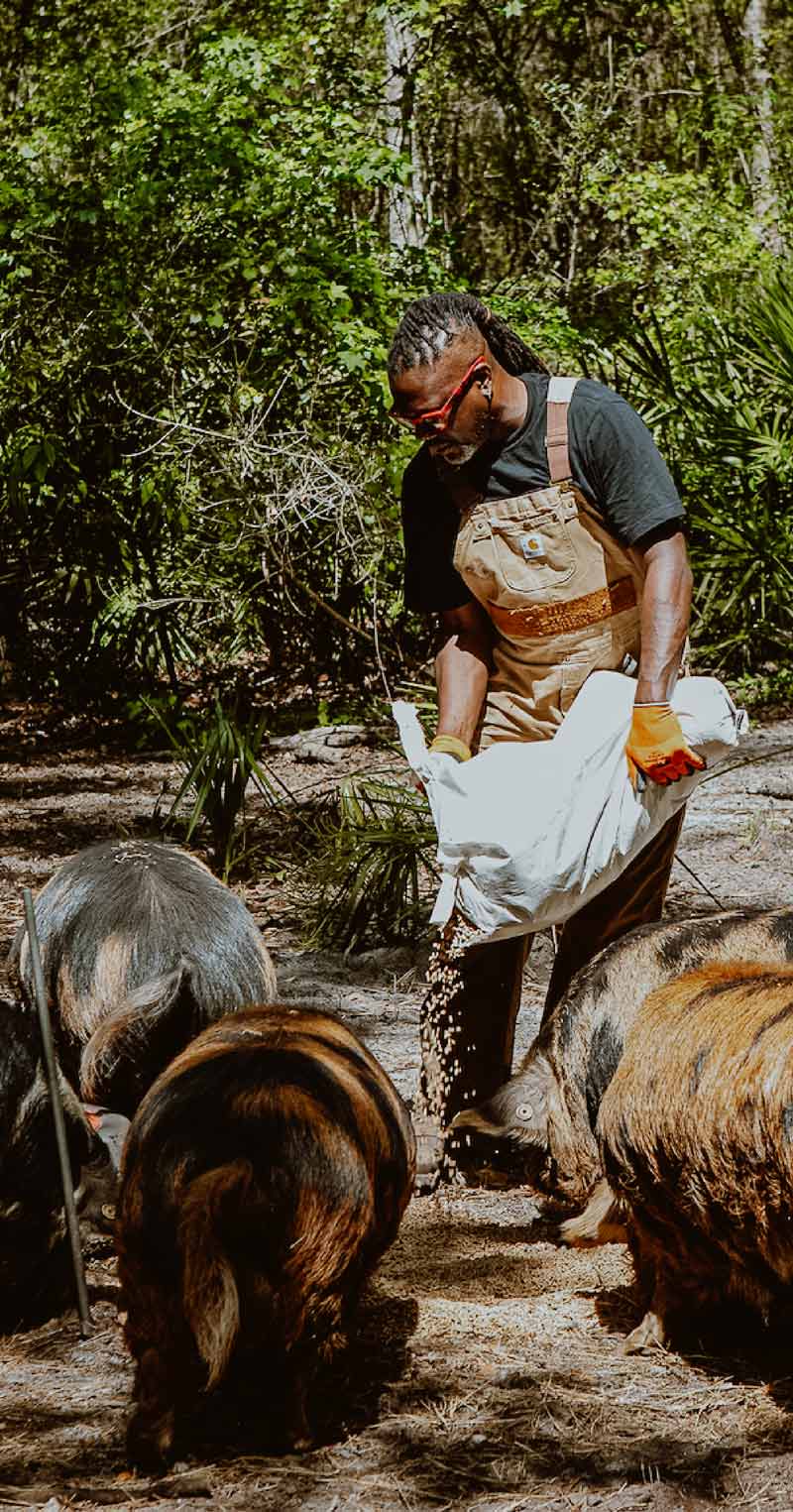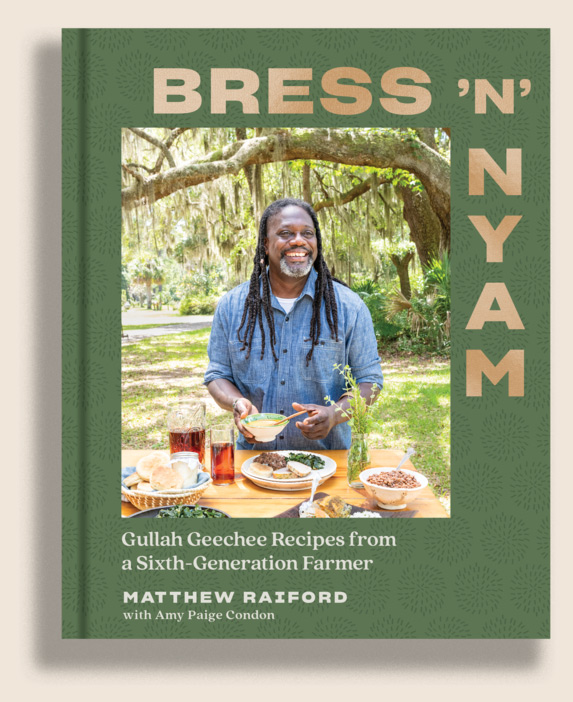Gilliard
Farms
Brunswick, Georgia
“We’re connecting all these pieces that are rooted in the soil, rooted in the planet, rooted in our mindfulness of our communities and families…We’re not going to break or fix the cycle within our generation or within our lifetime. However, it can be the start of something. It is the start of something that is really, I feel, needed in this country.”
– Tia Raiford
What might happen in our food system if it shifted from a corporate mandate to one of terroir?
That is, the ecosystem and conditions of place – altitude, climate, seasons and microbiome – that inform the unique production qualities within a micro-region and the specific methods and subcultures determining how a crop is farmed, processed or produced. The concept of terroir has roots in French viticulture (wine culture), expressing the unique character of a grape crop based on the environment and farming practices that raised it, intended to transmit the integrity of the final product – a bottle of wine.
Matthew and Tia Raiford, self-dubbed CheFarmers– yes, chefs and farmers– reference terroir in their shared food philosophy, which acknowledges the myriad of relationships and energetic exchanges between land, farmers, chefs, and consumers that facilitate meaningful food experiences. When context, conditions, and connections are centered in food and farming, nourishment extends beyond the taste buds, and even the physical body, fulfilling a deeper longing in our whole being, a spiritual or energetic transmission.
Looking back to find a way forward
Matthew and his sister Althea were the sixth generation to take on the family farm in 2012. Founded in 1874 by their great-great-great grandfather, then recently emancipated, Jupiter Gilliard, the farm is a cornerstone of the Brunswick community. Jupiter’s purchase of the 478 acres was a tremendous feat for a Black man in the late 1800s. Then, Jupiter’s vision was an oasis for freed Black folks. Fast forward to the present, Brunswick was also the home of 25-year old, Ahmaud Arbrey, who was lynched in 2021. Clearly, Jupiter’s visions for Black liberation are still being fought for. Matthew insists that the most monumental thing he’s done was garner the courage to return home to a Southern heritage he’d been raised to feel conflicted about. Despite the racist humiliation he suffered as a child in Brunswick, Matthew’s devotion to Gullah Geechee cultural preservation and Jupiter’s hope for future generations are reflected in his multimedia work and debut cookbook, Bress ‘n’ Nyam (“Bless and Eat” in Gullah Geechee), which carry many family artifacts and recipes.
To borrow from Heritage Works, a local organization led by preservationist Helen Ladson, a friend and partner of Gilliard Farm, “the story of the Gullah Geechee culture is so vast that one could not possibly be able to tell nor know all that there is about it.” The Gullah Geechee people are descendants of enslaved Africans who worked on and along the southern coastline and barrier islands in marshlands conducive to rice farming. Known for their unique creole and place-based culture, the Gullah Geechee are among marginalized American histories and cultures that are being revived by preservationists like Matthew Raiford.
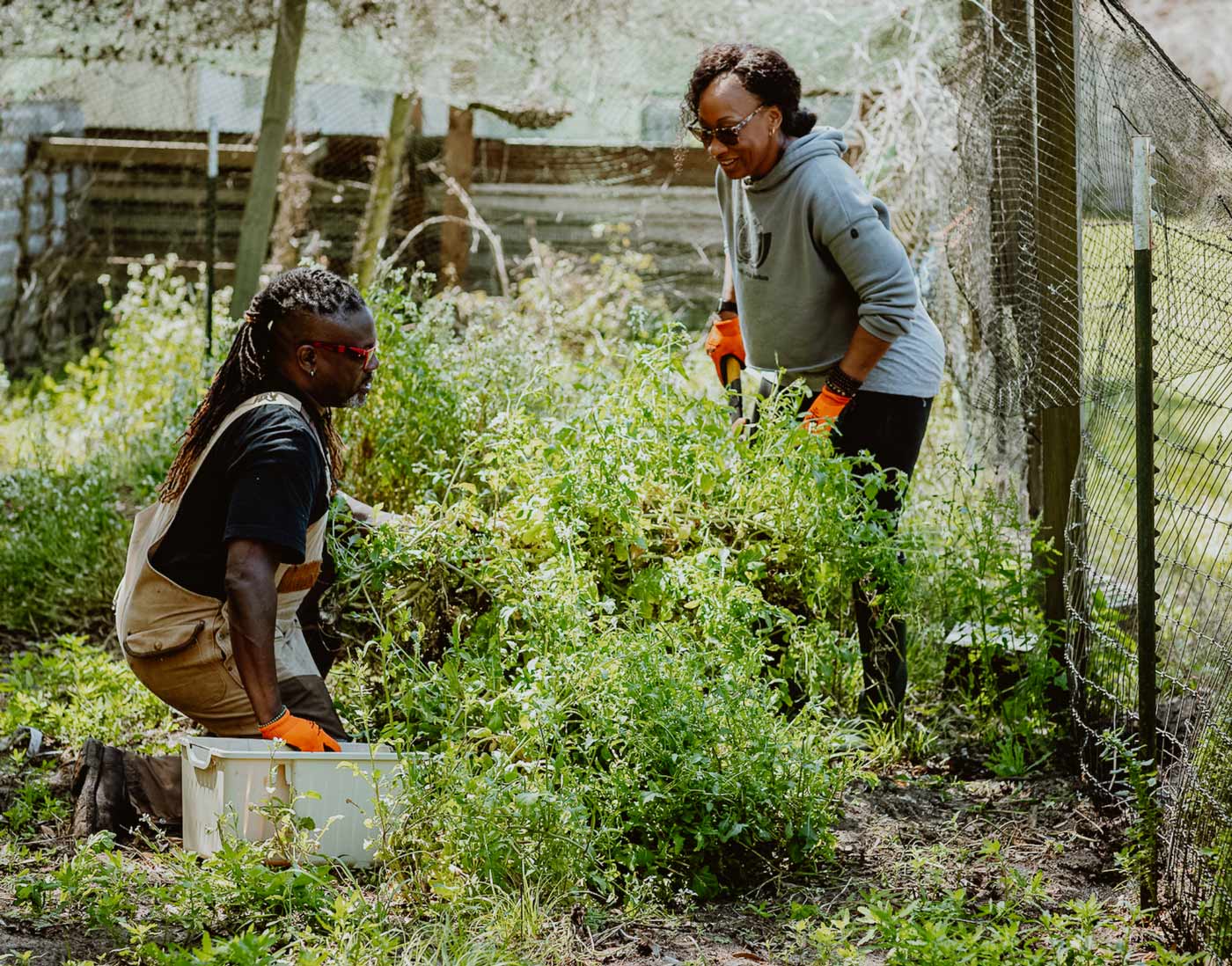
As a daughter – and granddaughter – of the Great Migration whose parents landed in Connecticut, Tia had, in many ways, left the South behind.
A remarkable thing happened two weeks into Matthew and Tia’s marriage: they discovered that Tia’s 3 times great grandfather Bill McDonald was also born in Glynn County, just eight years after Jupiter Gilliard. While Bill was eventually sold and moved to Alabama, both of their ancestors had roots in Brunswick…and perhaps, called them home. This story of Tia’s past, one of hundreds of thousands of untold stories of African American personal history, affirmed her present. She was surprised by her own adaptability to living in a rural area for the first time and recognized the imprint of her ancestry in her ease on the farm.

The lens of culinary art equips the Raifords with not just an appreciation, but an aptitude for identifying opportunities to enhance food experiences through the value of place. As culinarians with intimate familiarity of the food cycle from seed to plate, Gilliard Farm allows Tia and Matthew to practice a holistic approach to regenerative agriculture in every choice they make – from selecting partners and
A clear sense of responsibility to their various communities orients them in this work. So, it is only natural that an arrival to Gilliard Farm begins with a tour of the land to honor the stories of six generations of freed Black farmers who worked it and the living history present throughout it. The three-hundred-year-old oak tree, adorned with Spanish moss, in the center of the property and Union School, the first schoolhouse available to Black children in the area from 1907 until the end of segregation in 1955, are milestones on the tour. After a decade of events and visitors, the welcome tour now serves as an appropriate grounding in the layers of unique racial, social and personal history present on the farm and in Brunswick.
An intentional regional ecosystem
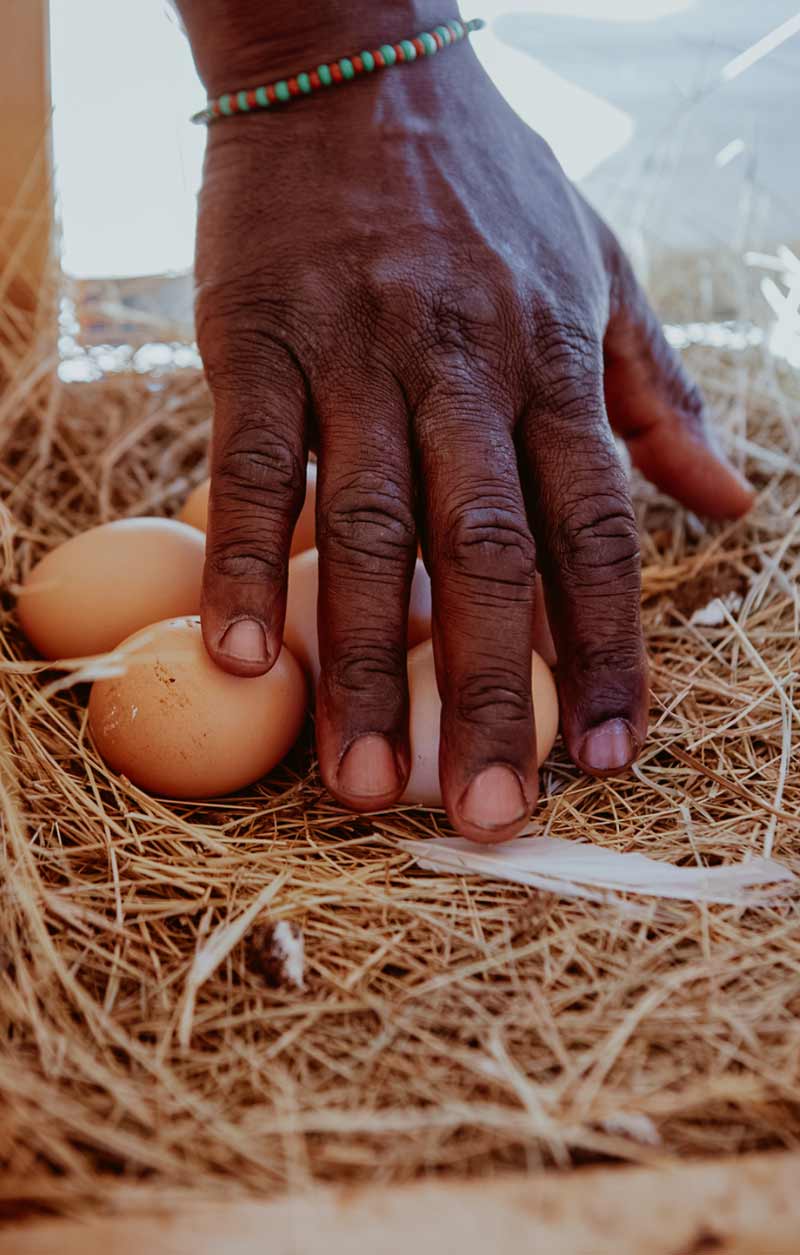
Prioritizing community interdependence is another expression of the old ways in their approach. In addition to maintaining crops that are native to the region, Gilliard Farm produces for like-minded businesses like Simple Man Distillery, who will use Gilliard’s culantro and hibiscus in their Gullah Geechee Gin, and host educational and dinner events on site. Tours also feature the experimental garden and medicinal herb gardens, including a body sovereignty garden, Tia’s response to recent legal infringements on women’s body sovereignty. The herbalist of the couple (though Matthew is currently in training), Tia continues the kitchen medicine of her people by working with medicinal plants such as mullein, turmeric, aloe vera, calendula, goldenrod – some of which are featured in her tea line, Zazou Teas, and SR9’s’s beauty product line, Lewa beauty (Lewa is Yoruba for beautiful).
With Heritage Works, they are working to create economic development opportunities, including training local docents as griots (oral history keeps, in the African tradition) to tell the rich histories of Brunswick. 100 Miles, and On The Fly Outfitters are just a few members of the dynamic community helping to keep Brunswick’s physical and historical landscapes thriving. Whether through local oysters, deer and pheasant hunts, or fly-fishing excursions, together with other local purveyors they maintain Brunswick’s food system.
Food as a Teachable Moment
Their unique vantage points as chefs and farmers inspired the place-based cooking curriculum they’re developing as a resource for cooks and farmers alike.
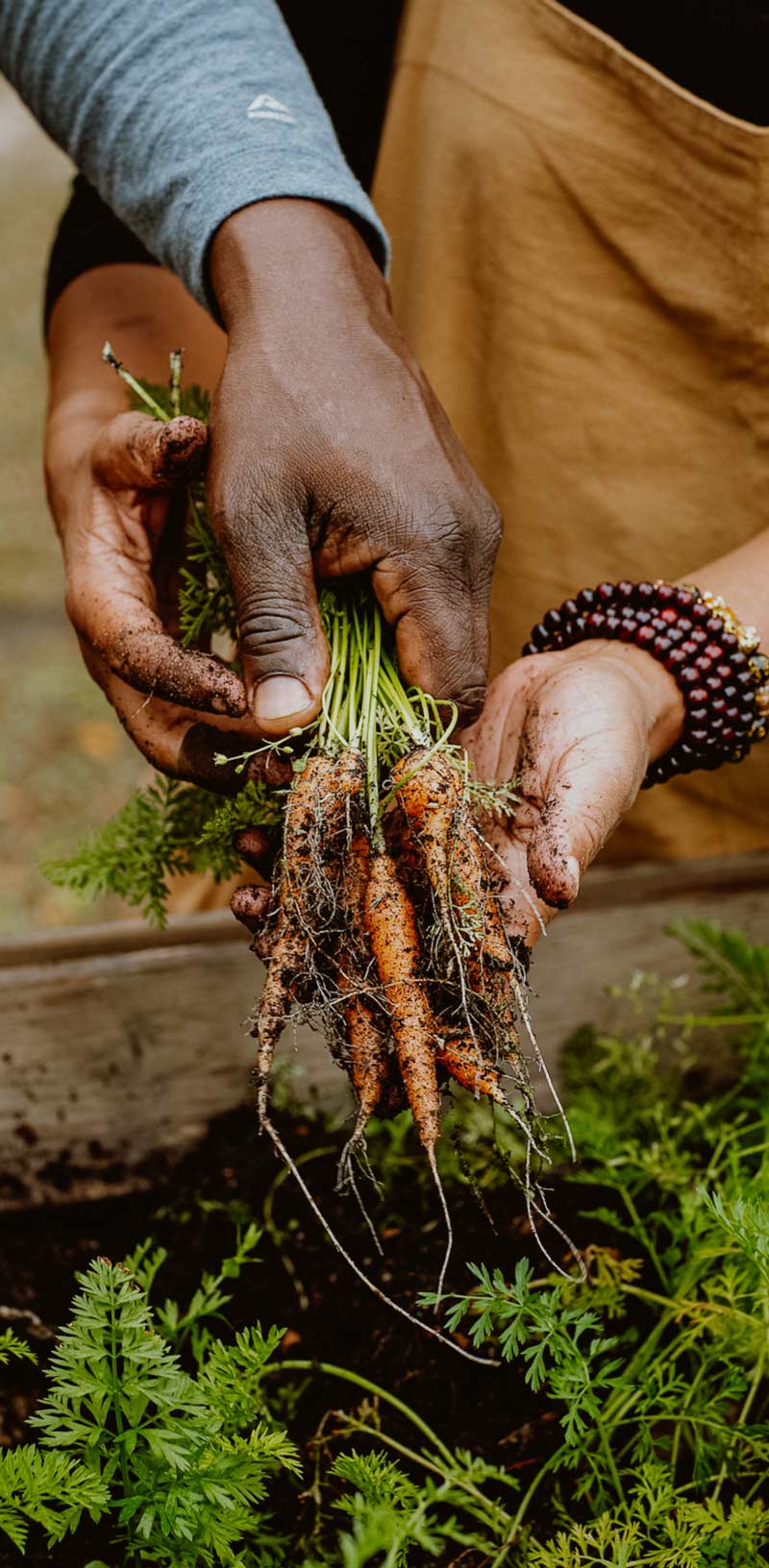
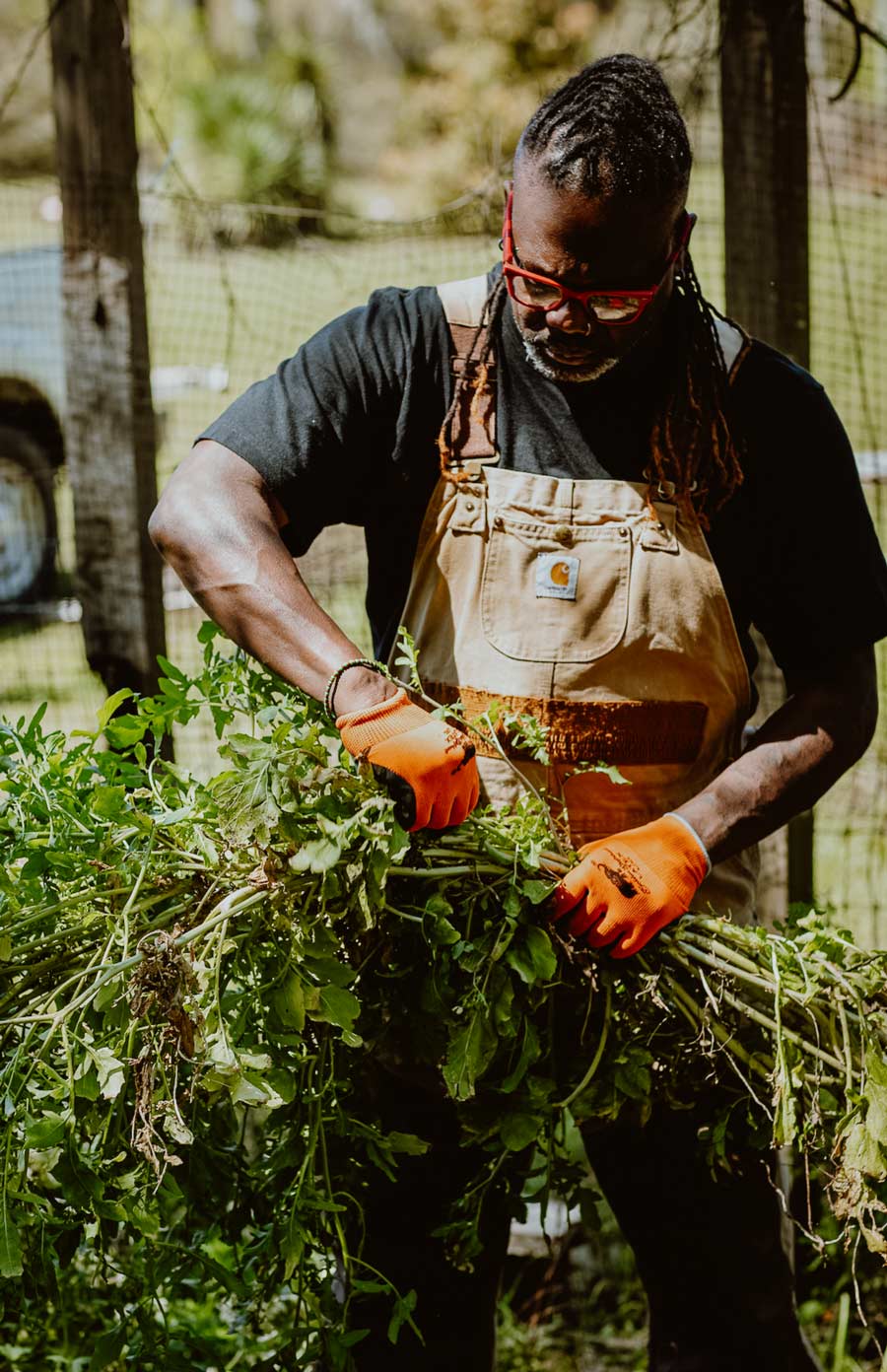
There are so many people who are trying to get back to understanding these connections… what food is grown within a season, the knowledge of what time of year the best crop is. That’s not common practice in the kitchen. What I saw lacking was the connection between chefs and farmers…Most chefs don’t know how to be farmers and most farmers don’t know how to be chefs. Because they don’t work in each other’s worlds ever, there’s this disconnect between what one [believes one] can and can’t do,
– Matthew Gilliard
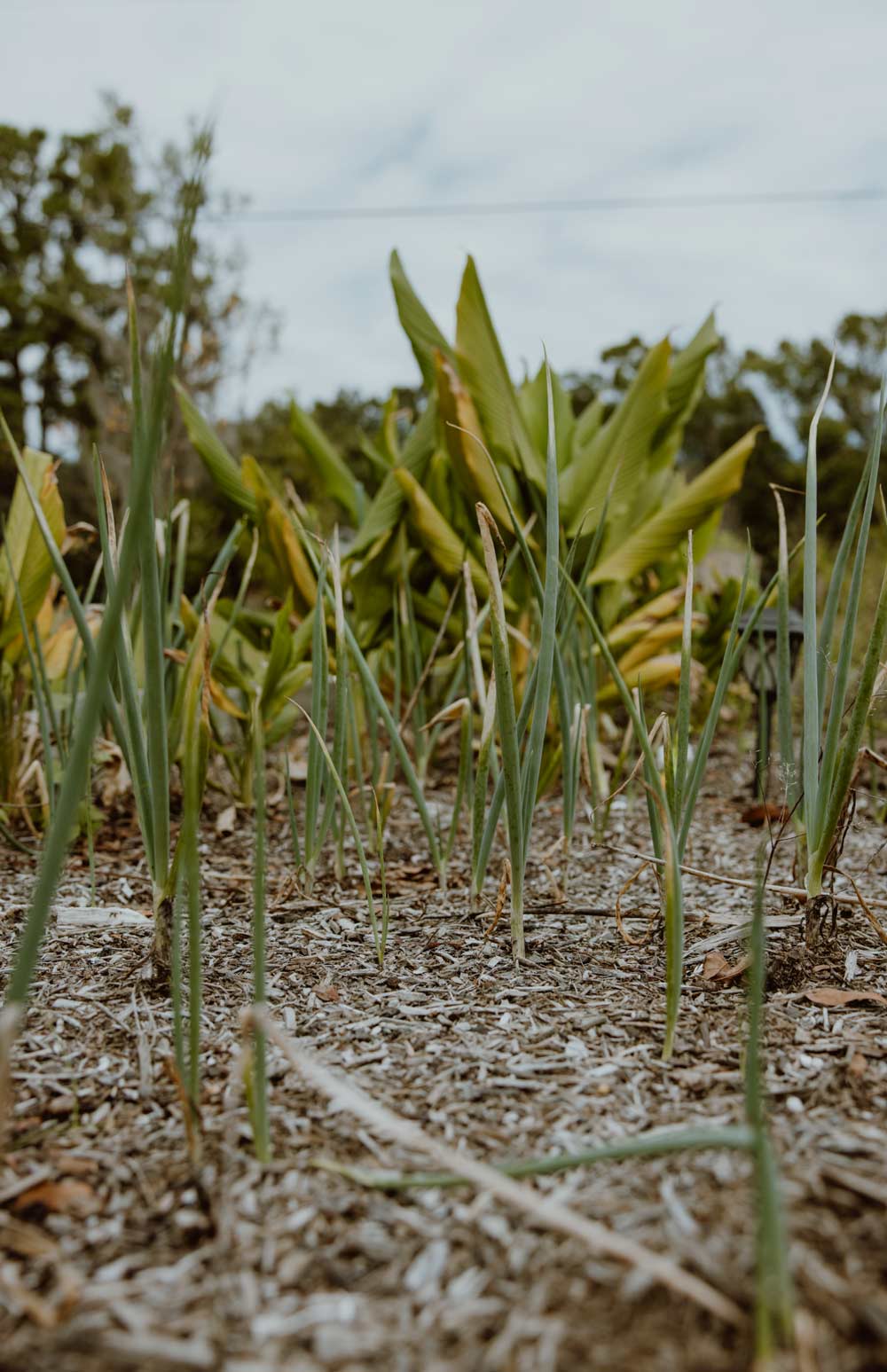
And as in terroir, “place” is as socio-cultural as it is geographical for them. Matthew says,“You have to understand that food is rooted in community… whether it is a bunch of people cooking or one person cooking for a bunch of people it is a community. The level of engagement in those communities is what you have to know as a cook, but also you bring your sense of community to that too, in all of your fundamentals you are bringing your history of food, you’re bringing your culture.I can make French food but I am still bringing my Blackness into it. I respect the space and where the food comes from and I respect the space of who I am serving it to.” To paint a picture, they explain how a classic French Mornay sauce, fundamental to any formal culinary education, is methodologically exactly what Black folks of the South commonly call “mac and cheese sauce.” The lens of Blackness that Tia and Matthew layer onto their culinary background offers important reframing of the dominant narratives in the food and farming space that have overlooked long-standing cultural practices of indigenous, Black, and brown communities. “When I bring my Blackness to the table, it expands how we can make things.”
Hospitality as a step towards Healing Justice
It is one thing to inherit a farm and quite another to continue a legacy. Matthew and Tia have harnessed their gifts and skills to do just that: build a legacy that offers their communities space and energy to heal and expand through food. Within their philosophy, when we tend to one living thing, we are tending to a larger part of the whole – the whole community, the whole living organism, the Earth.
Strong Roots 9 at Gilliard Farm is the brand that the Raifords manage together, the home for holistic offerings that allow them to reach consumers with their vision of collective healing. Those include on- and off-site culinary and wellness events, food and wellness products featuring farm-grown ingredients, cultural and educational resources (like the curriculum). Ultimately, SR9 is about reconnecting Black folks with bodily knowledge, an expression of their commitments to the integrity and thriving of land and community.
As certified wellness practitioners, the couple want the farm to be of service to healing from the social conditions that Black folks are subject to structurally and systemically, much like how Jupiter sought to create security for his people when he bought it. Through SR9, the farm will continue to be a gathering space and site of cultural and historical preservation and expand to offer immersive experiences focused on healing and wellbeing for Black folks. “I see these as bringing us back to connecting to self, the body, and place, with an anti-racist lens, says Tia. Reflecting on how the farm can support Black folks reconnecting to food and farming, Matthew says…”we are intelligent, beautiful, magnificent people that deserve to return to spaces and experiences that reflect living the best life possible.”
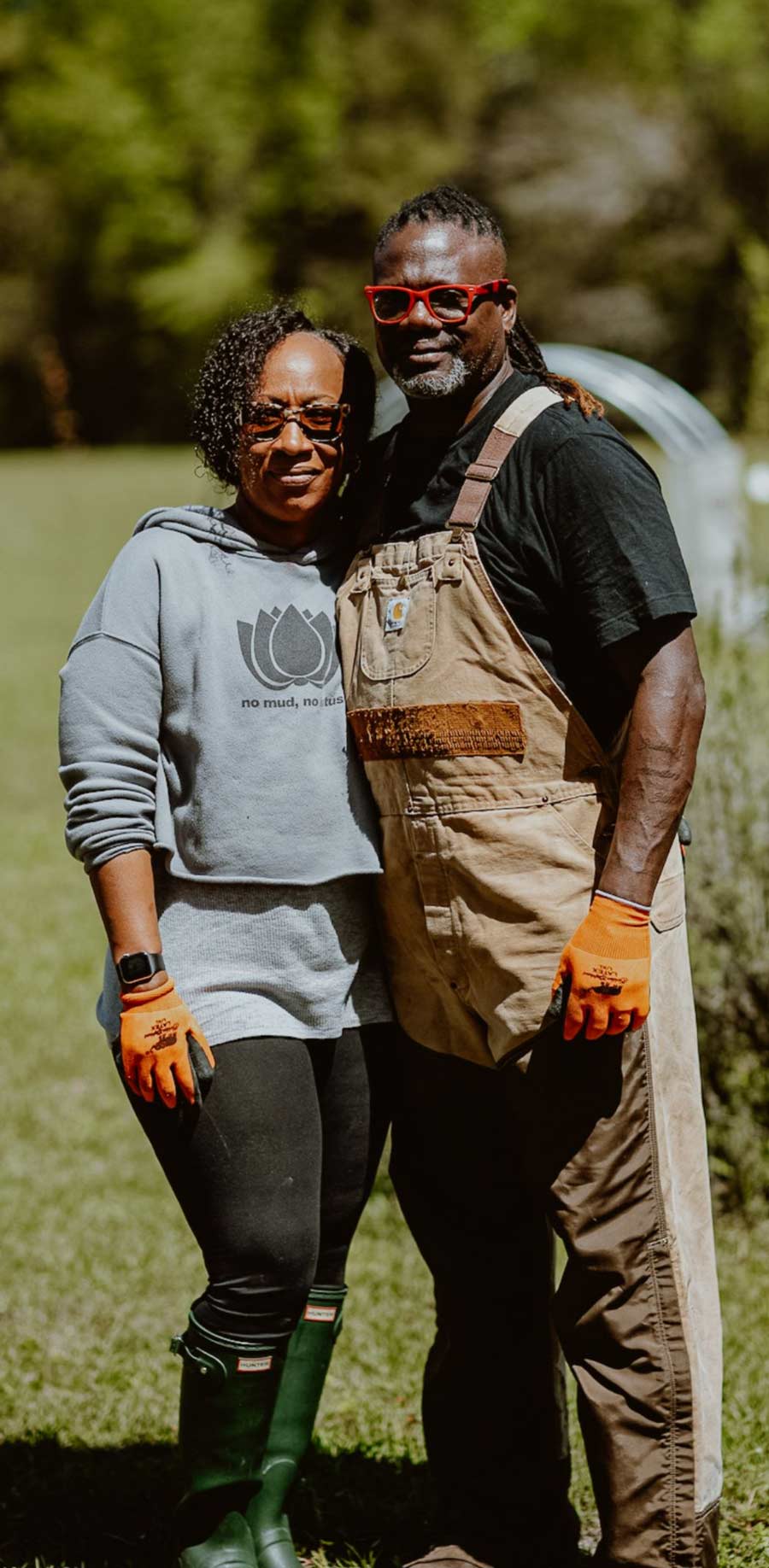
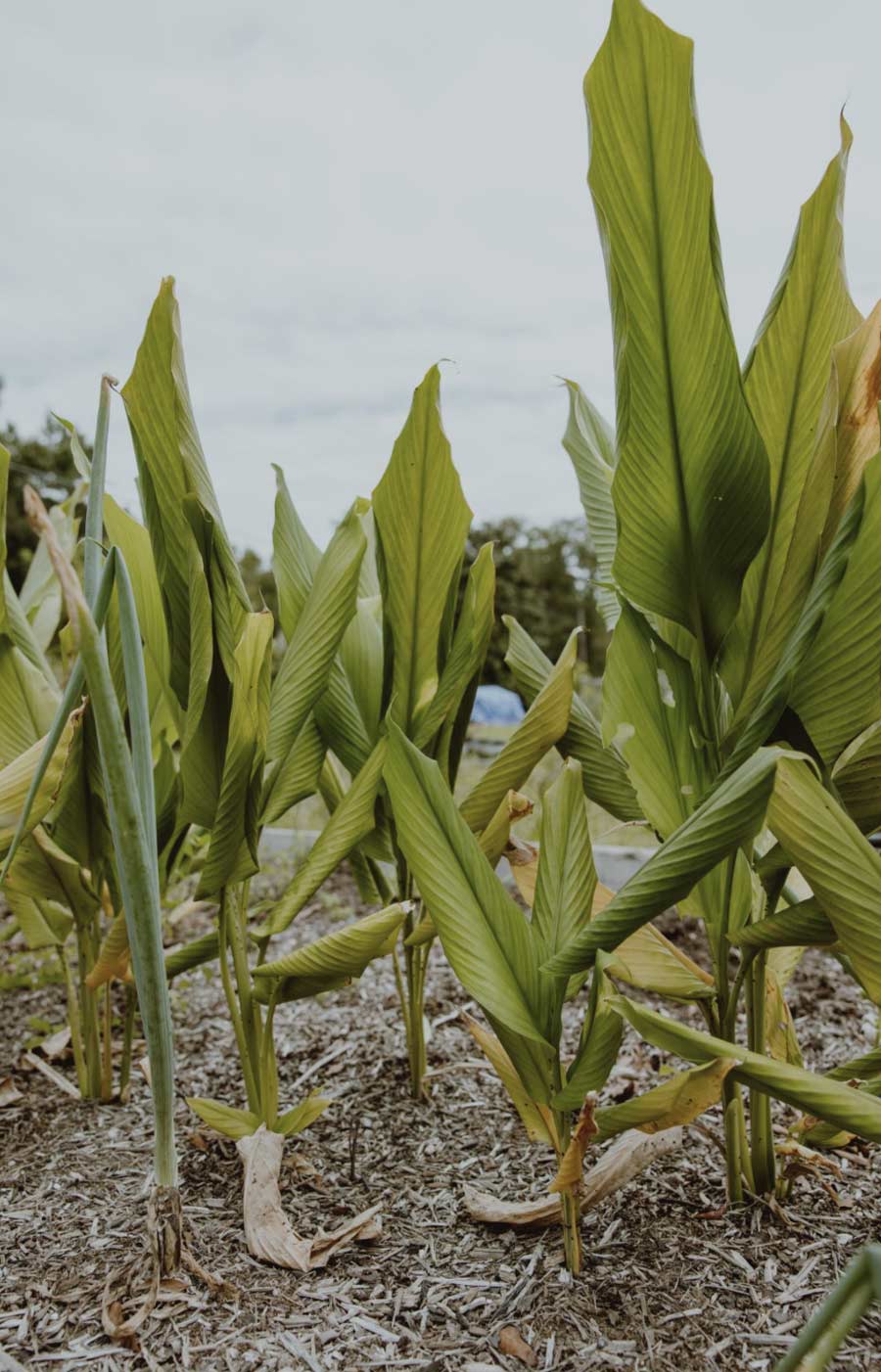
“It ain’t about my legacy. It ain’t even about my kids’ legacy. It’s about my community. When you become an elder, it’s about the community’s legacy.” Matthew echoes, “ Everything I do becomes a thing for the community, for the diaspora, for generations to come. And that’s why I’ve consistently talked about the legacy in the soil, because if we don’t take care of what’s underneath our feet, that we normally don’t care about, because most of the time it’s just concrete. Right? But underneath those six, seven layers of concrete is earth. That’s E-A-R-T in the Gullah Geechee language.”
What better use of a historic farm, whose soil and harvest carry the intelligence of the many hands that have tilled it than a site of re-membering, re-connection, and retreat?
How to
Support
Contribute to their efforts to preserve the economic vitality and unique cultures
including foodways – of their Glynn County Georgia community through the Heritage Works Career Readiness Program. The goal of Heritage Works is to provide a 3-track career readiness that educates and influences African American Gullah Geechee descendants to impact the tourism/hospitality sector through historic interpretation/docent training, culinary arts, and architectural rehabilitation with a focus on entrepreneurship. This program offers practical skills to grow towards self-sufficient and self-reliant (kugichagulia) Gullah Geechee communities.

Purchase Matthew's Cookbook

Purchase Strong Roots 9 / Gilliard Farm Products

Follow Strong Roots 9 on Instagram
